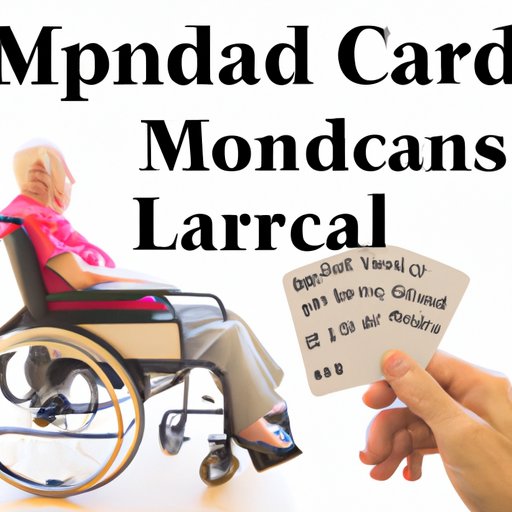Introduction
Long term nursing home care can be expensive and often is not covered by traditional health insurance plans. For some individuals and families, Medicaid may provide a solution to help cover the costs of long term nursing home care. This article will explore the benefits and costs of Medicaid coverage for long term nursing home care, as well as the eligibility requirements and state-by-state variations in coverage.
Exploring the Benefits of Medicaid Coverage for Long Term Nursing Home Care
Medicaid is a joint federal and state program that provides healthcare coverage for individuals and families who meet certain income and asset requirements. It is one of the largest sources of funding for medical and health-related services for low-income individuals and families. Medicaid covers a wide range of services, including doctor visits, hospital stays, prescription drugs, and long term nursing home care.
Medicaid covers many of the costs associated with long term nursing home care, including room and board, medical services, and personal care services such as assistance with bathing, dressing, and eating. In addition, Medicaid may also cover other services such as physical, occupational, and speech therapy, as well as medical supplies and equipment.

Understanding the Eligibility Requirements for Medicaid and Long Term Nursing Home Care
In order to qualify for Medicaid coverage for long term nursing home care, individuals must meet certain income and asset requirements. These requirements vary from state to state, but generally speaking, individuals must have an income below a certain level and assets below a certain amount. Assets include cash, bank accounts, stocks, bonds, real estate, vehicles, and other items of value. Individuals may be able to keep some assets, such as their home, and still qualify for Medicaid coverage.
In addition to meeting the income and asset requirements, individuals must also provide documentation to prove that they are eligible for Medicaid. This may include proof of citizenship or legal residency, Social Security numbers, birth certificates, and tax returns. Each state has its own set of rules and regulations regarding the documentation required to qualify for Medicaid, so it is important to check with your local Medicaid office for more information.
Examining the Cost Implications of Medicaid for Long Term Nursing Home Care
Medicaid is funded by both federal and state governments, so the cost of coverage varies depending on where you live. Generally speaking, the federal government pays for about half of the cost of Medicaid, while the state pays for the remaining half. However, some states may choose to pay more than their share, which can lead to lower costs for Medicaid recipients.
In addition to the government funding, individuals may also be responsible for some out of pocket expenses. These can include co-payments for doctor visits and prescription drugs, as well as premiums for certain services. It is important to note that out of pocket expenses will vary depending on the state and the individual’s financial situation.
Investigating State-by-State Variations in Medicaid Coverage for Long Term Nursing Home Care
While all states offer some form of Medicaid coverage for long term nursing home care, there can be significant differences between states in terms of eligibility criteria and coverage levels. For example, some states may require individuals to have a certain level of income and/or assets in order to qualify for Medicaid, while other states may have more lenient requirements. Additionally, some states may offer more comprehensive coverage than others, meaning that individuals may be able to receive more services and/or higher levels of reimbursement for those services.
It is important to research the Medicaid program in your state in order to understand the eligibility requirements and coverage levels available. You can contact your local Medicaid office or visit the Medicaid website to learn more.

Comparing Private Insurance Options to Medicaid for Long Term Nursing Home Care
In addition to Medicaid, there are also private insurance options that may be able to help cover the costs of long term nursing home care. Private insurance typically offers more comprehensive coverage than Medicaid and may cover a wider range of services. However, private insurance can also be more expensive than Medicaid and may require higher out of pocket expenses.
When comparing private insurance and Medicaid, it is important to consider the pros and cons of each option in order to make the best decision for your situation. Private insurance may provide more comprehensive coverage, but it may also be more expensive. On the other hand, Medicaid may provide more limited coverage, but it may be more affordable.

Assessing the Impact of Medicaid on Families Seeking Long Term Nursing Home Care
Medicaid can provide much needed financial relief to families seeking long term nursing home care for their loved ones. In addition to providing coverage for the costs of care, Medicaid may also help ease the financial burden on families by reducing out of pocket expenses. However, it is important to remember that Medicaid coverage comes with eligibility requirements and potential out of pocket expenses, so it is important to carefully weigh the pros and cons before making a decision.
In addition to the financial implications, Medicaid can also have emotional implications for families. The process of applying for Medicaid can be complicated and time consuming, and the result may not always be what families were hoping for. It is important to remember that there are resources available to help families navigate the process and make informed decisions.
Conclusion
Medicaid can be a helpful resource for individuals and families seeking long term nursing home care. It can provide coverage for many of the costs associated with care, as well as reduce out of pocket expenses. However, it is important to understand the eligibility requirements and potential out of pocket expenses before making a decision. Additionally, there can be significant state-by-state variations in Medicaid coverage, so it is important to research the Medicaid program in your state. Finally, there are also private insurance options that may be able to help cover the costs of care, so it is important to compare the pros and cons of each option before making a decision.
For more information about Medicaid and long term nursing home care, contact your local Medicaid office or visit the Medicaid website.
(Note: Is this article not meeting your expectations? Do you have knowledge or insights to share? Unlock new opportunities and expand your reach by joining our authors team. Click Registration to join us and share your expertise with our readers.)
